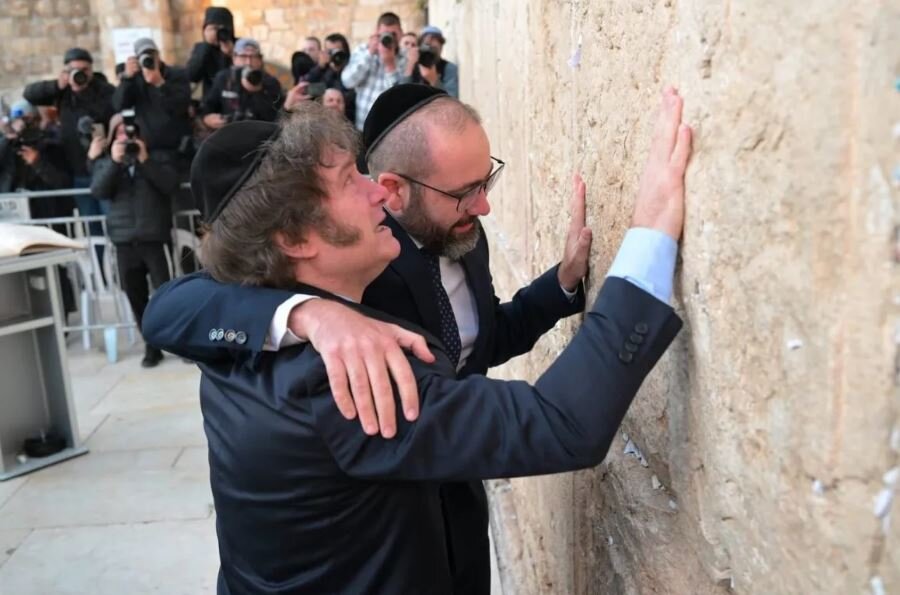The AMIA case: When the roles of murderer and victim are reversed

TEHRAN – Since Javier Milei came to power in January 2024, Argentina’s government has made a stark shift in its international relations policy, abandoning its traditional stance of neutrality and multilateralism in favor of aligning with the Zionist regime and the United States.
Over the past year and a half, Milei has built his foreign policy on hostility toward countries that oppose the hegemonic world order, challenge the status quo, or stand against Israel, deliberately turning a blind eye to the realities unfolding on the international stage, particularly in West Asia.
In one of his first official foreign trips, Milei visited the occupied Palestinian territories and announced that Argentina would move its embassy from Tel Aviv to al-Quds. Throughout this period, despite the Zionist regime’s crimes in Gaza and the massacre of Palestinian women and children, he has framed its actions as "defending democracy" and repeatedly claimed that Israel stands "at the forefront of defending Western civilization." In line with this, his government took another step in appeasing Israel by designating Hamas as a terrorist organization in June 2024, absurdly claiming that Israel has not committed any extreme measures in Gaza.
Argentina’s far-right government has also cast doubt on the rulings of international war crimes tribunals and opposed efforts to prosecute the Zionist regime’s prime minister and war minister, effectively siding with Israeli war criminals. Its support for the Zionist regime’s criminal actions at the UN General Assembly further demonstrated its unconditional allegiance to this ruthless, child-killing regime.
This irrational approach has reached such extremes that President Milei now considers any country critical of the Zionist regime’s crimes as an enemy, framing such hostility as an ideological principle.
In this context, following the Zionist regime’s aggressive attack on Iran’s national sovereignty and territorial integrity, Argentina’s president, in a reckless and internationally abnormal move, distorted the facts and condemned Iran’s decisive missile response—a legitimate act of self-defense under Article 51 of the UN Charter—as if Iran had attacked occupied territories, and as if Milei expected Iran to welcome Israeli soldiers with open arms.
This is not the first time Milei has stood against Iran in defense of the Zionist regime. After Operation True Promise I, he similarly condemned Iran for its defensive actions. Recently, in an interview with RT, he absurdly declared Iran an "enemy of Argentina," baselessly linking it to the suspicious 1990s bombings of the AMIA Jewish center and the Israeli embassy in Buenos Aires—claims that have never been substantiated.
A history of friendship, not enmity
A 120-year history of bilateral relations proves that Iran and Argentina have never been enemies. Before the 1994 AMIA incident, relations between the two nations were consistently friendly, marked by mutual respect and goodwill. Neither the Iranian nor the Argentine people have ever held negative views of each other, and public opinion in both countries has always spoken positively of the other.
For Iran, Argentina was a major supplier of food and agricultural products, while for Argentina, Iran was a reliable, long-term, and profitable market. It was only logical for both nations to maintain friendly ties. The question is: Who benefits from undermining this relationship?
From the very day of the AMIA bombing on July 17, 1994, Zionist and American-aligned media outlets pointed fingers at Iran and Hezbollah, making unsubstantiated claims about their involvement. Over the past 30 years, Argentina’s judiciary has focused solely on proving this narrative while ignoring other possibilities or potential actors.
The destruction of key evidence by Judge Galeano, Argentine police, and intelligence (SIDE), the bribing of witnesses and defendants to give false testimonies, and reliance on the statements of disreputable individuals seeking asylum by lying—all point to a coordinated effort by shadowy forces to sabotage Iran-Argentina relations and obscure the truth.
Three decades of fabricated allegations in a case tainted by evidence tampering have now become a tool for Zionist elements in Argentina to divert global attention from the regime’s crimes in Gaza and its unprovoked aggression against Iran in the 12-day war, twisting the narrative to make the murderer appear as the victim.
A call for responsibility
There are hopes that President Milei adopts a realistic, responsible, and national interest-driven approach, free from political theatrics and the influence of Zionist lobbying groups. He must not sacrifice Argentina’s interests to irrational and illogical support for actors seeking to destroy bilateral relations. History will judge those who side with oppressors over justice.
Leave a Comment